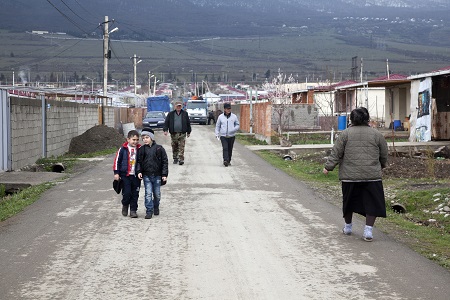World Bank addresses problems facing Georgia’s IDPs

The World Bank has released an article dedicated to addressing the problems facing Georgia’s Internally Displaced Persons (IDPs), such as limited access to food, money, jobs and opportunities.
The article, published last week, stated Georgia had about 270,000 IDPs from the occupied regions Abkhazia and Tskhinvali (South Ossetia). Nearly 80 percent of these people were unemployed.
Furthermore, many IDPs were unable to access sufficient land for pursuing agricultural ventures when land leasing could be an outcome to cope with the IDPs economic hardship, said the World Bank.
The article also said key issues should be addressed when designing a land-leasing program for IDPs.
The World Bank said:
- The land leasing program should be open to any rural household, not just IDPs. A program open to both groups of society would increase support for the program;
- The program should be implemented at community level with two to three nearby communities working together. Support from the municipality will be essential;
- The biggest challenge facing the program was finding land that was suitable and available for lease. Effective public outreach will be important for meeting this challenge;
- Most agricultural land is not registered and this will make it harder to identify owners. This could also lead to lease enforcement problems if conflicts arise. Parties involved in the land lease could either simply acknowledge these risks when signing leases, or the land could be registered before signature to lease the land; and
- The program should require that land leases be concluded in writing. Registration of leases should be voluntary.
Based on the recommendations above, a land leasing pilot was now being implemented in targeted villages where large concentrations of IDPs currently live in the Georgian municipalities of eastern Gori and western Zugdidi.
The World Bank said the pilot project was being implemented by a consortium consisting of the Danish Refugee Council and Abkhazeti Charity Humanitarian Centre, a local NGO with more than 20 years of experience working on improving the livelihoods of IDPs in Georgia.
Implementation of the project was guided by an intra-governmental Advisory Committee consisting of ministries and state agencies.
Results of the project, anticipated in June 2016, will allow for a deeper understanding of current land leasing practices in rural Georgia and potential entry-points for increasing and formalising land leasing practices to improve food security and income opportunities for the most vulnerable population, including IDPs, said the World Bank article.
See the full story here.
 Tweet
Tweet  Share
Share